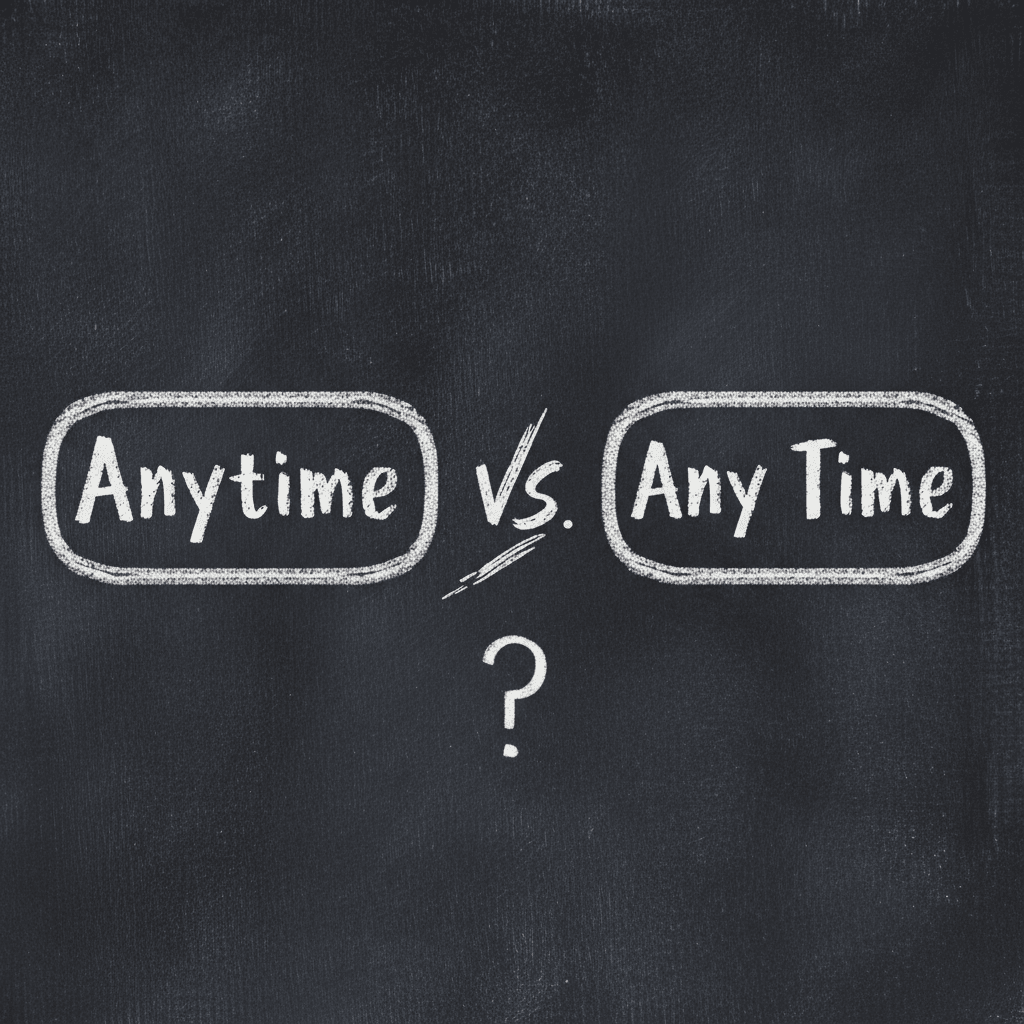“Anytime” vs. “Any Time”: What’s the Difference?
 The difference between anytime and any time depends on how you’re using the word — as an adverb or as a noun phrase.
The difference between anytime and any time depends on how you’re using the word — as an adverb or as a noun phrase.
Let’s make it simple.
Anytime: Informal Adverb (Means “Whenever”)
Meaning
“Anytime” is a single word adverb that means whenever or at any time.
It’s used in casual writing or speech, especially when referring to flexible timing.
Examples of “Anytime” (10 total)
- You can call me anytime.
- Come over anytime you want.
- I’m free anytime this weekend.
- Anytime you need help, just ask.
- You’re welcome anytime!
- He can visit anytime after lunch.
- I’ll meet you anytime that works for you.
- She’s ready to start anytime.
- Stop by anytime — my door’s always open.
- Anytime, buddy! (meaning: “You’re welcome.”)
🧠 Tip:
If you can replace it with “whenever”, use anytime (one word).
Any Time: Noun Phrase (Refers to an Amount of Time)
Meaning
“Any time” (two words) is a noun phrase — it literally means any amount of time.
It’s used in formal writing or when referring to time as a thing, not just a moment.
Examples of “Any Time” (10 total)
- Do you have any time to talk today?
- I don’t have any time to waste.
- She didn’t spend any time preparing.
- He hasn’t had any time off in months.
- We didn’t get any time to relax.
- If you have any time, let’s meet for coffee.
- Is there any time left on the clock?
- She didn’t take any time to think about it.
- There isn’t any time like the present.
- I can’t spare any time right now.
🧠 Tip:
If you can add a word like “the” or “some” before it (the time, some time), it must be any time (two words).
Quick Comparison Table
| Use | Form | Meaning | Example |
|---|---|---|---|
| Adverb (informal) | Anytime | Whenever | Call me anytime. |
| Noun phrase (formal) | Any time | Any amount of time | Do you have any time tomorrow? |
How to Remember the Difference
👉 Anytime = Whenever (adverb)
👉 Any time = Any amount of time (noun phrase)
💡 Memory Trick:
If you can replace it with “whenever,” write it as anytime.
If you can replace it with “an amount of time,” use any time.
Formal vs. Informal Usage
| Tone | Preferred Form | Example |
|---|---|---|
| Formal writing | any time | “We don’t have any time to delay.” |
| Casual speech or email | anytime | “You can text me anytime!” |
Why People (and AI) Mix Them Up
Because “anytime” looks natural in casual English, people often overuse it — even when “any time” would be grammatically correct.
That’s why Humanizey helps refine word choice automatically, making your text sound both natural and correct in context.
FAQs
1. Is “anytime” always correct?
Not always. It’s fine in casual speech, but use “any time” when referring to a measurable period.
2. Can I start a sentence with “Anytime”?
Yes, in informal writing. Example: Anytime you need me, I’ll be there.
3. Is “anytime soon” correct?
Yes — it’s an idiomatic phrase meaning in the near future. Example: I’m not leaving anytime soon.
4. Which is more formal?
Any time (two words) is more formal and always safe in professional or academic writing.
Practice: Choose the Correct Form (“Anytime” or “Any Time”)
(Answers are listed at the end.)
- You can call me ___ you want.
- Do you have ___ to talk?
- She’s welcome here ___.
- I don’t have ___ to lose.
- Come visit me ___ this week.
- He didn’t take ___ to think about it.
- You’re welcome ___.
- I haven’t had ___ off work lately.
- You can message me ___.
- Is there ___ left before the meeting?
Answers
- anytime
- any time
- anytime
- any time
- anytime
- any time
- anytime
- any time
- anytime
- any time
